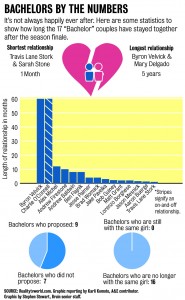On Hilgard, 50 girls hold their breath. The air is still, the tension thick. As the cameras zoom in on the final rose, the room stiffens, and each girl says a quick prayer for her favorite contestant. But just as the Bachelor begins to part his lips, the back doors fly open and the girls’ attention is torn from the TV screen.
 For these UCLA students, fantasy has become reality. Sean Lowe, the season 17 Bachelor, stands before them – with his heart-melting smile and a rose in hand.
For these UCLA students, fantasy has become reality. Sean Lowe, the season 17 Bachelor, stands before them – with his heart-melting smile and a rose in hand.
On campus, ABC’s “The Bachelor” has gained a crowd among college students and on Monday, America watched Lowe profess his love in the season finale. Although there are skeptics among fans, several UCLA viewers agree that this reality show clarifies the do’s and don’ts of dating. As a result, a “Bachelor” culture at UCLA has evolved alongside the show, culminating in a surprise visit from Lowe himself.
In early February, Lowe made a guest appearance at several of the sororities’ regular viewing parties on Hilgard. Sarah Rosenberger, a second-year economics student, met Lowe and said his presence caused a scene amid the room of loyal fans.
[media-credit id=2036 align=”alignright” width=”185″]
“When he showed up there was a deafening screech. People were still screaming for 20 minutes after he left – it was crazy,” Rosenberger said.
For college students, Rosenberger said the premise of “The Bachelor” is especially intriguing. She said students are at the age where they are looking for serious relationships and can relate – even though finding love on the show is becoming increasingly unrealistic.
After 17 seasons and 16 failed relationships from “The Bachelor,” Kevin Robinson, a second-year psychobiology student, said that even though he used to believe finding love was possible, it is becoming more difficult to believe in the fantasies shown on screen.
“It’s almost obnoxious at this point,” Robinson said. “Some people just try to get the fame and get the TV time rather than find true love.”
Instead of fostering romantic relationships between the Bachelor and his contestants, the show has increasingly been focusing on the drama by intentionally casting women who cannot get along with anyone in the house, said Vanessa Guerrero, a second-year political science student.
Guerrero said she thinks it is a red flag when a contestant becomes the center of every argument. She said she has learned that how people work in groups illustrates a key part about their character.
“It’s like when you go on job interviews. Even if they’re looking for one candidate, they do group interviews to see how you interact with others,” Guerrero said.
With so many women putting on facades to mask their confrontational personalities, Guerrero said the proposals in the show occur while the couple is still in the honeymoon phase. She said she has learned that it is important to take things slow when developing a new relationship.
“In order to keep a healthy relationship you can’t rush into things while you’re still in that newlywed phase,” Guerrero said. “You have to argue and hit obstacles because then you’ll find out if your relationship can overcome the rough times.”
Because this reality show prevents relationships from developing at a natural pace, Robinson said the show’s viewer appeal has changed toward entertainment purposes.
“Everyone wants to believe in true love, but nowadays it’s gotten to the point of ridiculousness,” Robinson said.
Although the show’s reputation as a romantic sanctuary has been shattered, Robinson said he reminisces on past seasons when he still believed it was possible for the Bachelor to find his soulmate.
Robinson said he hopes to become a Bachelor in the future and to re-instill America with the hope he had while watching Jillian Harris’ season of “The Bachelorette.”
“You could say it’s one of my life goals to be on ‘The Bachelorette,’ get second or third and then be chosen as the next Bachelor,” Robinson said.
